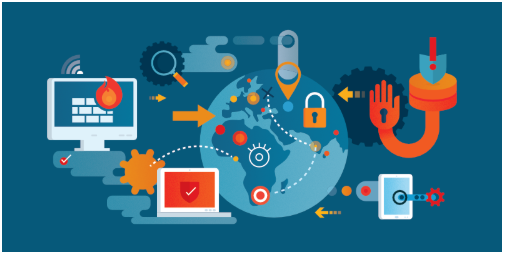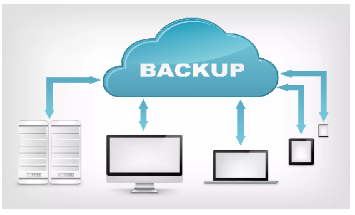Business
11 Steps to More Effective Small Business Security

Cyber-criminals don’t differentiate between small and large businesses. They target cyber-attacks on weak business securities, which are easy to hack and gain access to. Since small businesses have limited resources, funds, and experts for securing their business and their securities, their networks can be easily compromised; hence these fraudsters mainly focus on such companies to fulfill their malicious intentions. Statistics show that Data theft, Ransomware, Spear Phishing, internal threats, etc. are the most common forms of cyber-attacks noticed in small businesses.
Minimal or no investment in cyber-security is where these businesses make a mistake, and this proves to be fatal for their growth. In this digital world of today, you cannot ignore cyber-security, if you want your business to flourish and be safe from prying eyes.

Image Reference: https://appinstitute.com/cybersecurity-for-small-business/
There are many tools available for securing all types of businesses, but few essential security measures which are the best for small business do help to solve cyber-security issues. Let’s check out some effective business security solutions.
Effective Steps for Small Business Security:
1. Employee Training and Awareness:
Small businesses are under the misconception that fraudsters will not target them when there are a lot of large enterprises to target. Hence, they are negligent towards employee awareness and training, putting their business at risk. Cyber Security Statistics show that almost 43% of the cyber-attacks are made for small companies, out of which 60% of the small companies have irreparable damages and are out of business post-cyber-attack.
Hence employee awareness training is needed to take care of technical and non-technical breaches. Proper training regularly helps these small firms to take care of these breaches and maintain the confidentiality of their business.
2. Updated Software and Operating Systems:
One of the best ways to secure your small business is to update your software and operating systems regularly. Hackers with evil viruses try to find some vulnerability (loopholes) in your software to gain access to your computers, tablets, and data.
Software updates fix these holes with security patches, remove outdated versions, and improve security functions, thus keeping your devices secure.
Updated operating systems (Windows, Android, iOS) and browsers (Firefox, Internet Explorer, Chrome) give a tough time to hackers for accessing your network, thus keeping them at bay. Always keep regular free automatic updates to “On” mode for securing your small world.
3. Use Multi-Factor Authorisation (MFA):
MFA is one more layer of security for your business. The more the security layers are added, the more secure your business is because intruders find it challenging to pierce your systems by passing through these secure layers.

MFA is 99% effective against attacks because it works on multiple factors like:
- Something you know (passwords, pins)
- Something you have (mobile phones, security devices)
- Something else (fingerprint, voice, face, retinal scan)
Implementing MFA is costly and time-consuming, but it secures your business by adding protection layers.
4. Take care of Internal Threats:
Internal threats are more significant than external ones because internal employees who have grudges against the company (like terminated employees) are aware of the company’s network systems and have access to your business data.
Restricting unnecessary accesses to systems, strong remote access controls, and an adequately defined termination policy helps you to take care of these internal threats. IT department should be prompt enough to immediately withdraw network accesses, user accounts, e-mails, cloud services, VPN accesses, etc. given to terminated/left employees for security purposes.
Some internal threats can be non-intentional too, where an employee opens a compromised link. Here the installation of anti-virus software helps in protecting your system.
5. Regular Backups:
Backups are done daily come handy in case of catastrophes like a natural disaster, system crash, cyber-attacks, etc. The best option is to create backups in the cloud or any other reliable device.

Some best Cloud Backup Solutions:
- Carbonite
- OpenDrive
- SpiderOak
- Acronis
An effectively planned backup strategy and storage keeps your small business secured for prospering new heights.
6. SSL Encryption Security:
Visitors who are using internet and surfing websites daily are well versed with SSL security. SSL (Secure Socket Layers) uses an encryption technique to secure data. Any data in an encrypted format is in a coded format, which is difficult to guess or read. Only the receiver for whom the data is sent can decrypt and read the message.
SSL installation on the website shows a padlock in the address bar and “https” in the URL. These security symbols help attract more visitors to your site.
Talking about SSL brands like Comodo is a leading SSL brand having various security solutions for your business. If you think about SSL types then, you will find different SSL in the market; for instance, Comodo PositiveSSL Wildcard certificate is a domain validated SSL certificate which secures your domain and multiple sub-domains on the same and different servers. Installing an SSL certificate is one of the most cost-effective security solutions for your small business.
7. Scrap your documents:
Though it is a digital age and digital security matters the most, many times, paperwork also poses as a data-threat to your business. Information from sensitive documents or files can be passed on to competitors, thus causing damage to your business. Hence it is essential to scrap the confidential documents once their usage is over.
If possible, avoid keeping important stuff on paper. Prefer to store your information in digital format rather than in paper form for better security. Follow these tips to prevent data breach, that helps you to secure work.
8. Secure E-mails and Browsers:
Nowadays, most communication is done through e-mails and hence securing e-mails become a priority. Even browser security and the use of secured web gateways help prevent security vulnerabilities.
E-mails can be secured with SSL encryption security. Choosing difficult security questions and frequent changing of passwords will keep your account data safe from cyber-criminals.
For securing browsers, you can configure the browser privacy settings and ensure to keep your browser updated all the time. Use of secured web gateways helps in preventing inappropriate traffic from entering your network; by inspecting and scanning the traffic through multiple security checks.
9. Install Firewall:
Firewalls are those security layers that prevent unauthorized entities from accessing your networks. They protect your computer network by inspecting traffic coming to your site and prevent lousy traffic from penetrating to your network.
Few examples of budget-friendly firewalls:
- Cisco ASA
- Firewalla
- Sophos
- WatchGuard
- Norton
- Zscaler
Choose a firewall which not only prevents intruders, but also prevents malware attacks.
10. Install Anti-Virus Software:
Though employees of your business are trained for phishing attacks, and for discarding bad links or phishing e-mails, phishing statistics of 2019 indicate that 30% of the phishing messages are opened unknowingly by targeted users.
Select anti-virus software which not only prevents the virus from entering your network but also provides robust security, by taking care of anti-phishing, anti-malware, and anti-spyware attacks. Protection of mobile devices and desktops/laptops is also essential for your small business.
Examples:
- McAfee Total Protection
- Norton 360 Standard
- Avast Business Anti-virus Pro Plus
11. Safeguard your Wi-Fi:
Securing your Wi-Fi is all about protecting layers.
Few tips for securing Wi-Fi:
- Your business Wi-Fi is not public property, so ensure that it is not automatically connected to other networks apart from your own. Check the Windows setting for the same.
- Use Wi-Fi Protected Access (WPA) encryption method. Still more preferred is a WPA2 security method, which protects data and networks. WPA2 works on a unique encryption key for each wireless user, which connects to the network.
- Public Wi-Fi is very risky, so avoid using the same. If there is an urgent need to use it, ensure that you use an extra layer of encryption by using a VPN (Virtual Private Network).
- Separate your network traffic with VLANs for internal security.
Never keep your Wi-Fi open for intruders to gain access and always change your router’s passwords regularly for the safety of your network.
Wrapping Up:
With advanced crimes occurring in the digital world, keeping your business secure is a challenge.
But you can face this challenge and ensure strong safety against cyber-criminals by protecting your sensitive data, securing your hardware and software, networks and communications, and, finally, educating and training your employees for preventing cyber-attacks.
You can also hire outside experts to secure your business. Always remember that your small business world needs the same type of security and safety just like bigger enterprises; so, make sure you secure it minutely from top to bottom.
-

 Tech11 years ago
Tech11 years agoCreating An e-Commerce Website
-

 Tech11 years ago
Tech11 years agoDesign Template Guidelines For Mobile Apps
-

 Business6 years ago
Business6 years agoWhat Is AdsSupply? A Comprehensive Review
-

 Business10 years ago
Business10 years agoThe Key Types Of Brochure Printing Services
-

 Tech8 years ago
Tech8 years agoWhen To Send Your Bulk Messages?
-

 Tech5 years ago
Tech5 years ago5 Link Building Strategies You Can Apply For Local SEO
-

 Law5 years ago
Law5 years agoHow Can A Divorce Lawyer Help You Get Through Divorce?
-

 Home Improvement6 years ago
Home Improvement6 years agoHоw tо Kеер Antѕ Out оf Yоur Kitсhеn

































